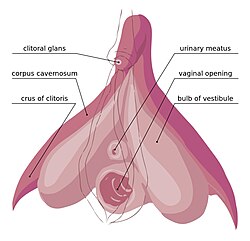Crus of clitoris
| Clitoral crura | |
|---|---|
 The internal anatomy of the human vulva, with the clitoral hood and labia minora indicated as lines. | |
| Details | |
| Part of | Clitoris |
| Artery | Deep artery of clitoris |
| Lymph | Superficial inguinal lymph nodes |
| Identifiers | |
| Latin | crus clitoridis |
| TA98 | A09.2.02.002 |
| FMA | 20175 |
| Anatomical terminology | |
The clitoral crura (sg.: clitoral crus) are two erectile tissue structures, which together form a "V" shape. Crus is a Latin word that means "leg". Each "leg" of the V converges on the clitoral body. At each divergent point is a corpus cavernosum. Together with the vestibular bulbs, they form the clitoral root. The crura are attached to the pubic arch, and are adjacent to the vestibular bulbs. The crura flank the urethra, urethral sponge, and vagina and extend back toward the pubis. Each clitoral crus connects to the rami of the pubis and the ischium.[1]
During sexual arousal, the crura become engorged with blood, as does all of the erectile tissue of the clitoris.[2][3]
The clitoral crura are each covered by an ischiocavernosus muscle.[4]

See also
[edit]References
[edit]- ^ Ginger, VA; Cold, CJ; Yang, CC (March 2011). "Surgical anatomy of the dorsal nerve of the clitoris". Neurourology and Urodynamics. 30 (3): 412–6. doi:10.1002/nau.20996. PMID 21298720. S2CID 22501531.
- ^ Hite, Shere (2006). The Shere Hite reader sex, globalization, and private life. New York: Seven Stories Press. ISBN 1609800362. Retrieved 17 October 2015.
- ^ Wessells, Norman K.; Center, Elizabeth M.; Kistler, Henry B. (1992). Vertebrates, a laboratory text (2nd ed.). Boston: Jones and Bartlett. p. 201. ISBN 0867208538.
- ^ "Anatomy Atlases: Atlas of Human Anatomy in Cross Section: Section 6: Pelvis, Perineum, Hip, and Upper Thigh". anatomyatlases.org.


 French
French Deutsch
Deutsch